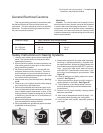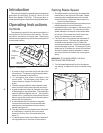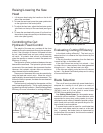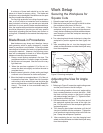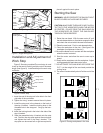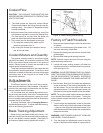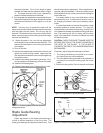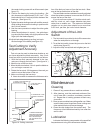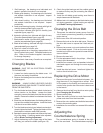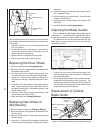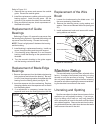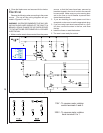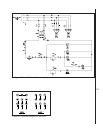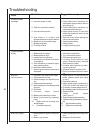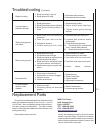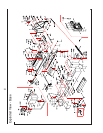
15
1. Ball bearings: the bearings are lubricated and
sealed—periodic lubrication is not required.
2. Blade guide bearing: the bearings are lubricated
and sealed—lubrication is not required. Inspect
periodically.
3. Idler wheel bushing: the bearings are lubricated
and sealed—lubrication is not required. Inspect
periodically.
4. Lead screw bearing housing: lubricate with light oil
monthly (see exploded figure, page 20).
5. Lead screw: lubricate with light oil monthly (see
exploded figure, page 20).
6. Hydraulic cylinder pivot: lubricate with light oil every
6 months (see exploded figure, page 20).
7. Blade tension screw: lubricate with grease every 6
months (see exploded figure, page 24).
8. Blade brush bearing: lubricate with light oil monthly
(see exploded figure, page 24).
9. Gear box: check oil once a year.
10. Change coolant on a frequency appropriate to the
type of coolant being used. Oil based coolants can
sour. Refer to the coolant supplier’s instructions
for change frequency.
11. Coolant tank: clean every 6 months or as required.
Changing Blades
WARNING: SHUT OFF ALL ELECTRICAL POWER
TO THE MACHINE.
1. Loosen four knobs securing the blade cover. Lift
the cover and swing it backward.
2. Remove the blade guard mounted to the left blade
guide support.
WARNING: ALWAYS WEAR LEATHER GLOVES
WHEN HANDLING SAW BLADE TO AVOID INJURY
FROM THE SAW TEETH.
3. Turn the blade tensioning hand wheel clockwise to
relieve tension on the blade. Loosen the blade
enough to remove the blade from the idler and drive
wheels. Remove the blade from between the blade
guides.
4. Install the new blade between the blade guide bear-
ings and the carbide blade guides. Install the blade
over the drive and idler wheels.
5. Turn the blade tensioning hand wheel counterclock-
wise to tighten the blade. Tighten the blade until the
blade tension indicator reads 2000 pounds.
6. Operate the saw at low speed and observe the track-
ing of the blade. If tracking needs to be adjusted,
refer to Blade Tracking Adjustment.
7.
Adjust the bearings on the upper edge of the blade
until they just contact the blade (see figure
19).
8. Check the guide bearings and the carbide guides
to make sure they are just contacting the sides of
the blade.
9. Install the left blade guard making sure there is
ample clearance with the blade.
10. Make a test cut to make sure the blade tracks prop-
erly during operation. Adjust tracking as required
(see Blade Tracking Adjustment).
Changing the Drive Belt
1. Disconnect the electrical power source from the
cut-off saw to prevent any possibility of accidental
motor start-up.
2. Set the arm at the full horizontal position.
3. Remove the knob on the drive belt cover. Remove
the drive belt cover to expose the V-belt and pul-
leys.
4. Remove two screws, nuts, and washers from back
of saw head support. Push on the motor support
bracket to pivot the motor upward to loosen the ten-
sion on the belt.
5. Remove the worn belt.
6. Put the replacement belt in the pulleys. Allow the
motor to pivot downward.
7. Install the two screws, nuts, and washers in back of
saw head support and through the motor support
bracket.
8. Install the drive belt cover. Install and tighten the
knob on the drive belt cover.
Replacing the Drive Motor
1. Disconnect the motor from all electrical power. Un-
plug the motor if it is plugged into a socket. Shut
off the power to the branch and remove the con-
nection to the junction box if the motor is hard wired
to the branch.
2. Remove the drive belt from the drive motor pulley
(see Changing the Drive Belt).
3. Remove motor pulley.
4. Open the motor junction box and disconnect the
power cord wires from their terminals.
5. Remove the nuts, washers and bolts that secure the
motor to the mounting plate.
6. Installation of a new motor is a reversal of the above
steps.
Adjusting the
Counterbalance Spring
The counterbalance spring is located at the right,
rear of the saw head. The counterbalance spring is



